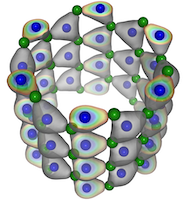
|
Noncovalent Functionalization of Boron Nitride Nanotubes Using Poly(2,7-carbazole)s
N. A. Rice, W. J. Bodnaryk, I. Tamblyn, Z. J. Jakubek, J. Lefebvre, G. Lopinski, A. Adronov, and C. M. Homenick Journal of Polymer Science, 58, 13, 1889-1902 (2020) To fully actualize the potential of boron nitride nanotubes (BNNTs), it is necessary to overcome the inherent insolubility of this nanomaterial. Drawing on the successes realized in the analogous carbon nanotube field, noncovalent functionalization with conjugated polymers offers a simple, scalable route toward the production of stable dispersions of BNNTs. 2,7-carbazoles were chosen as our core monomer based on density functional theory (DFT) predictions, which suggest superior interactions with BNNTs when compared to fluorene-BNNT interactions. Homo poly(2,7-carbazole)s and copolymers with fluorenes were synthesized and used successfully to disperse BNNTs into organic solvents. Thermogravimetric analysis and atomic force microscopy results confirm the proficiency of these polymers to disperse large amounts (> 80% by weight) of individualized BNNTs. Analysis of absorbance data shows that the choice of solvent is critical, with stability enhanced in THF compared to CHCl3 due to the more efficient planarization of polymer chains on the surface of BNNTs, particularly for the homopolymers. The utility of these highly-soluble poly(2,7-carbazole)-BNNT complexes for printed electronics and transparent composites was demonstrated by the fabrication of simple capacitors and incorporation into poly(methyl methacrylate) composites, respectively. |



